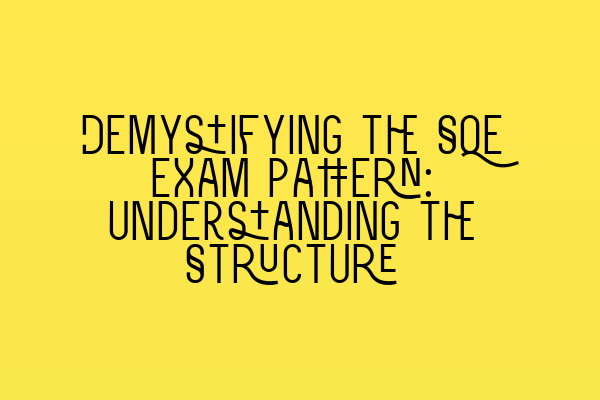Demystifying the SQE Exam Pattern: Understanding the Structure
Are you feeling overwhelmed by the upcoming Solicitors Qualifying Examination (SQE)? Don’t worry, you’re not alone. The SQE is a challenging test that assesses your practical legal skills and knowledge. To help you prepare effectively, it’s important to understand the structure of this exam.
Breaking Down the SQE Exam
The SQE consists of two stages: SQE1 and SQE2. Each stage consists of multiple exams that assess different aspects of your legal abilities. Let’s take a closer look at each stage:
SQE1:
SQE1 focuses on testing your functioning legal knowledge. It comprises of two exams:
- Functioning Legal Knowledge (FLK) Exam: This exam assesses your knowledge of core legal principles and concepts. It is a multiple-choice test designed to gauge your understanding of areas such as contract law, constitutional law, criminal law, and more.
- Legal Research Exam: This exam evaluates your ability to find and use legal resources to solve legal problems. It assesses your research skills, critical thinking, and reasoning abilities.
SQE2:
SQE2 focuses on assessing your practical legal skills. It also consists of two exams:
- Written Skills Exam: This exam tests your ability to draft legal documents and communicate legal advice effectively. It evaluates your written communication skills, professionalism, and attention to detail. You may be required to draft legal memos, client letters, or advices.
- Practical Legal Skills Exam: This exam evaluates your ability to apply legal principles in practical situations. It assesses your problem-solving skills, negotiation abilities, and advocacy skills.
Understanding the Format and Timing
It is crucial to understand the format and timing of each exam to manage your time effectively during the SQE. Here’s what you need to know:
FLK Exam:
The FLK Exam is a computer-based multiple-choice test consisting of 180 questions. You will have 3 hours and 45 minutes to complete the exam. Each question will have four possible responses, and you must select the most appropriate answer.
Legal Research Exam:
The Legal Research Exam is also a computer-based test, consisting of two legal problem scenarios. You will have 2 hours and 45 minutes to read and analyze the scenarios, research relevant legal materials, and provide well-reasoned answers.
Written Skills Exam:
The Written Skills Exam is a written assessment that evaluates your ability to draft legal documents accurately and effectively. You will have 4 hours to complete this exam. It could involve drafting legal memos, letters, or advices based on given information.
Practical Legal Skills Exam:
The Practical Legal Skills Exam assesses your practical legal skills through various tasks. It may include role play scenarios, advocacy tasks, and negotiation exercises. The timing for this exam varies depending on the specific task, and you will be provided with the relevant information beforehand.
Preparing for Success
To excel in the SQE, it’s essential to have a comprehensive study plan that covers all the exam components. Here are a few tips to help you prepare effectively:
- Understand the exam structure: Familiarize yourself with the exam format, content, and timing for each component.
- Practice regularly: Solve practice questions for the FLK Exam to improve your understanding of core legal concepts. Also, practice legal research exercises and hone your drafting and problem-solving skills.
- Work on time management: Develop strategies to manage your time effectively during the exams. Allocate specific time slots for different tasks and practice working within the given time limits.
- Seek guidance: Consider enrolling in SQE training programs or seek guidance from experienced solicitors to gain valuable insights and advice on exam preparation.
The SQE can be challenging, but with the right approach and diligent preparation, you can succeed. Understanding the exam pattern, format, and timing is the first step towards achieving your goal of becoming a qualified solicitor. So, stay focused, stay motivated, and give it your best shot. Good luck!

Leave a Reply